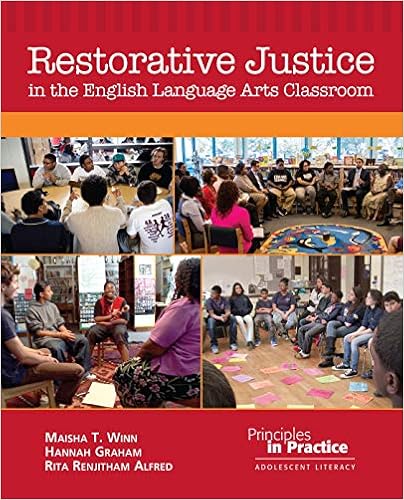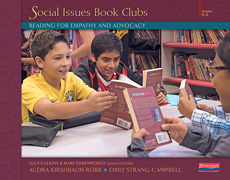
This guide highlights the Curriculum Center's collection of resources that model representation and diversity in the curriculum and encourage reflection and engagement with children and teens.
 Restorative Justice in the English Language Arts Classroom
by
Restorative Justice in the English Language Arts Classroom
by
 Social Issues Book Clubs
by
The topic of social issues, the lens for reading in this unit, is a topic that matters greatly to the young human beings who enter our classrooms every day. In middle school, many kinds of issues start to weigh more heavily on students: relationship issues, school issues, and a growing awareness of larger societal pressures. There can be serious consequences to the spiraling troubles that surround middle school kids. A recent Washington Post article titled "Does Reading Make You a Better Person?" concludes that the answer to the title question is "Yes!" Reading literature especially has proven to increase people's ability to empathise with others, and to be more socially aware. A driving force in this unit is the power of reading to transform how we see others and to show us new ways to be kind, to connect, and to stand up for what's right. We want our middle grades students to become flexible, resilient readers, we want them to have a toolkit of strategies for dealing with difficulty, and we want them to read broadly and deeply, alert to the intricacies of texts and to the power of language. To accomplish such ambitious goals, we need classroom structures and resources that support this kind of explicit teaching and learning. The reading workshop offers a simple and predictable framework for teaching strategies and for giving students feedback while they are in the midst of the ever-changing, complex reading work they will do across the middle school grades. The Units of Study for Teaching Reading series saves teachers hundreds of hours of planning, freeing time for analysing student work, working with individuals and small groups, and for studying with colleagues. The series provides teachers with the tools and support they need to move students quickly and efficiently toward grade-level expectations, while also helping kids become proficient, lifelong readers.
Social Issues Book Clubs
by
The topic of social issues, the lens for reading in this unit, is a topic that matters greatly to the young human beings who enter our classrooms every day. In middle school, many kinds of issues start to weigh more heavily on students: relationship issues, school issues, and a growing awareness of larger societal pressures. There can be serious consequences to the spiraling troubles that surround middle school kids. A recent Washington Post article titled "Does Reading Make You a Better Person?" concludes that the answer to the title question is "Yes!" Reading literature especially has proven to increase people's ability to empathise with others, and to be more socially aware. A driving force in this unit is the power of reading to transform how we see others and to show us new ways to be kind, to connect, and to stand up for what's right. We want our middle grades students to become flexible, resilient readers, we want them to have a toolkit of strategies for dealing with difficulty, and we want them to read broadly and deeply, alert to the intricacies of texts and to the power of language. To accomplish such ambitious goals, we need classroom structures and resources that support this kind of explicit teaching and learning. The reading workshop offers a simple and predictable framework for teaching strategies and for giving students feedback while they are in the midst of the ever-changing, complex reading work they will do across the middle school grades. The Units of Study for Teaching Reading series saves teachers hundreds of hours of planning, freeing time for analysing student work, working with individuals and small groups, and for studying with colleagues. The series provides teachers with the tools and support they need to move students quickly and efficiently toward grade-level expectations, while also helping kids become proficient, lifelong readers.